Anti-war Martyr Aaron Bushnell vs the Pro-war Western Media
How his life sacrifice unfolded in the news
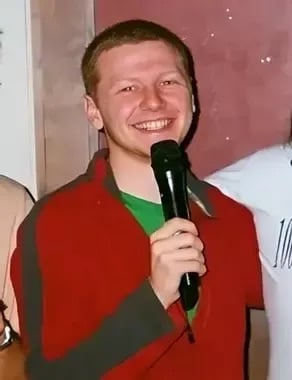
All Global Research articles can be read in 51 languages by activating the Translate Website button below the author’s name (only available in desktop version).
To receive Global Research’s Daily Newsletter (selected articles), click here.
Click the share button above to email/forward this article to your friends and colleagues. Follow us on Instagram and Twitter and subscribe to our Telegram Channel. Feel free to repost and share widely Global Research articles.
Big Tech’s Effort to Silence Truth-tellers: Global Research Online Referral Campaign
***
The rather sweet-faced young airman planned his final act carefully.
After realizing that his life was not worth more than the lives that are being destroyed in Palestine, Aaron Bushnell imagined a way to “turn our eyes to Gaza” and its enormous human losses, while adding his life to theirs.
To succeed in turning attention to Gaza meant somehow capturing the extensive media coverage that has been mostly supportive of Israel.
Therefore, on Sunday February 25, 2024, Aaron strode grim-faced towards the Israeli embassy in Washington.
En-route, wearing his military fatigues, he spoke calmly to his camera.
He had chosen his words carefully:
“I will no longer be complicit in genocide. I am about to engage in an extreme act of protest for compared to what people have been experiencing in Palestine at the hands of their colonizers, it is not extreme at all. This is what our ruling class has decided will be normal.”
After setting up his camera on the ground, he walked several paces, turned his back to the embassy, and poured a powerful accelerant all over himself and ignited it. Immediately engulfed in flames, Aaron repeatedly yelled “Free Palestine,” until he finally collapsed.
He streamed the entire event on twitch. (It’s disturbing footage; please consider your decision before watching it.)
Aaron left a final Facebook message just before he carried out his plan. It provided a link to the live-stream documentation he had set up. And he asked us to consider:
“Many of us like to ask ourselves, ‘What would I do if I was alive during slavery? Or the Jim Crow South? Or apartheid? What would I do if my country was committing genocide?’
“The answer is, you’re doing it. Right now.”
What Followed in the Media?
The media headlines responded typically as follows, doing an immense disservice to the 30,000 Palestinians killed to date, and to the man who gave his life to generate media coverage:
The Washington Post even smeared him:
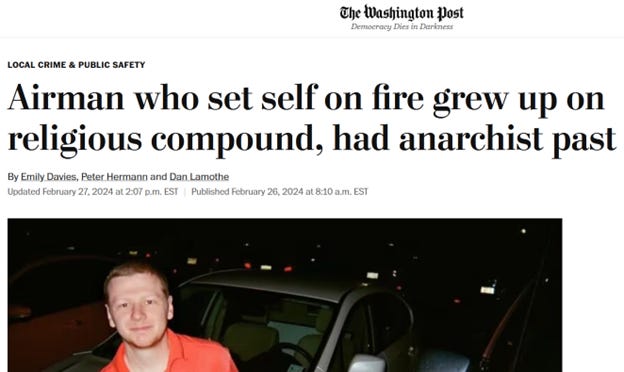
NPR, after nearly 24 hours, was not able to identify Bushnell’s motives, even though he had shouted “free Palestine” as he burned:
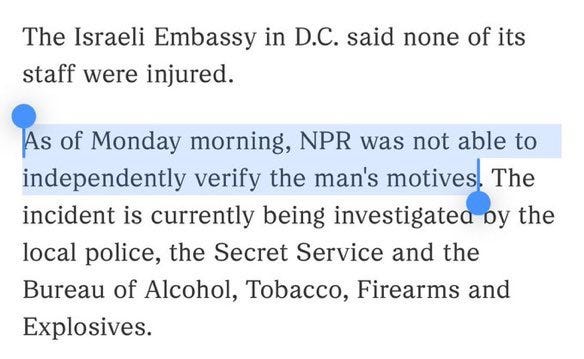
Only CNN reported Aaron’s words about the normalization of genocide:
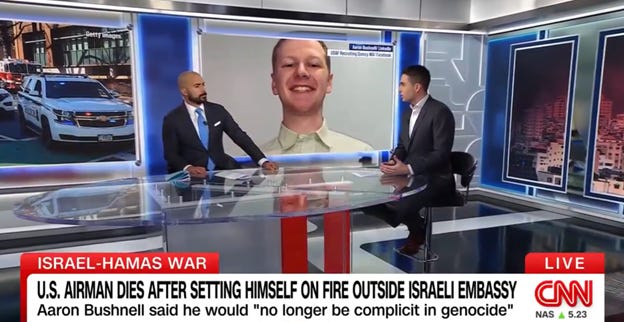
Regarding CNN’s response, independent journalist Caitlin Johnstone observed on Twitter/X:
He did it. Aaron Bushnell forced this to happen. He did something so jarring and impactful that the mass media would be forced to report the raw facts about it if they want to avoid internal conflict like CNN and NYT have been experiencing in recent weeks. He left them no choice.
Journalist Abby Martin wrote:
For Bushnell, the torment meant also having to put on the uniform of the institution loading the weapons, running the supply missions, providing assistance to the genocide. Bushnell saw he was an accomplice to all that. The truth killed him.
But the media has been historically blind to the agony in Gaza:
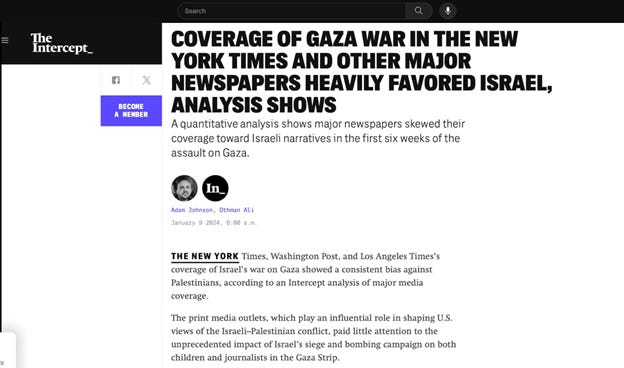
Screenshot from The Intercept
Somehow, we have to make Aaron Bushnell’s ultimate sacrifice worthwhile.
We need to stop this war in the names of all who have died in Gaza — whom he chose to join in suffering and death — and mark his gift of sacrifice to peace on the day he died, February 25th of each year.
*
Note to readers: Please click the share button above. Follow us on Instagram and Twitter and subscribe to our Telegram Channel. Feel free to repost and share widely Global Research articles.
This article was originally published on the author’s Substack, Lizzy’s Newsletter.
Elizabeth Woodworth is highly engaged in climate change science and activism. She has published 42 articles on Global Research, is co-author of “Unprecedented Climate Mobilization”, “Unprecedented Crime: Climate Science Denial and Game Changers for Survival,” and co-producer of the COP21 video “A Climate Revolution For All.” She is author of the popular handbook on nuclear weapons activism, “What Can I Do?” and the novel, “The November Deep”. For 25 years, she served as head medical librarian for the BC Government. She holds a BA from Queen’s and a Library Sciences Degree from UBC.
She is a regular contributor to Global Research.
Featured image source


